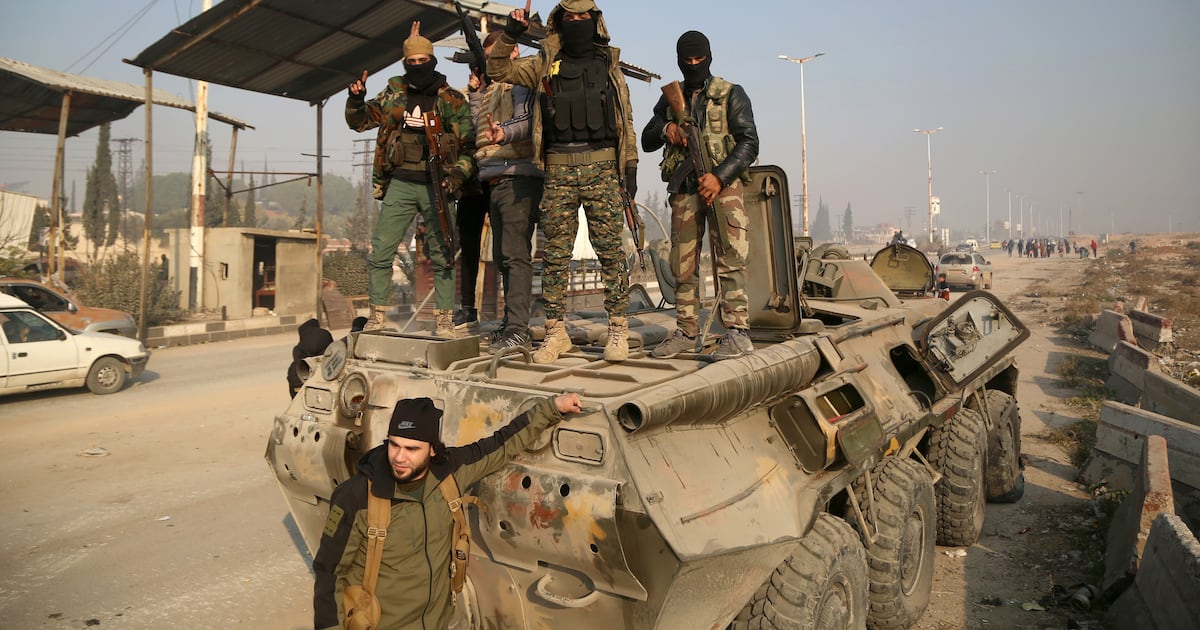Britain forged a backdoor relationship with Hayat Tahrir Al Sham before the group’s rise to power in Syria, which facilitated the UK’s diplomatic return to the country after the fall of the Assad regime, an outgoing spy chief said on Friday.
“Having forged a relationship with HTS a year or two before they toppled Bashar Al Assad, we forged a path for the UK government to return to the country within weeks,” MI6 chief Sir Richard Moore said in a speech at the British consulate in Istanbul.
Mr Moore did not provide details of the relationship with Hayat Tahrir Al Sham. The time frame he provided suggests it developed after the group formally severed its ties with Al Qaeda, but was still banned as a terrorist organisation by the UK government for its links to the group.
HTS was formally dissolved after its leader Ahmad Al Shara took power in Damascus, but its members retain key leadership positions in the new Syrian authorities. Britain has yet to remove the terrorist designation.
Britain’s then-foreign secretary David Lammy confirmed soon after Mr Al Assad’s fall that the UK had had previous contact with HTS. But the MI6 chief’s comments on Friday expanded on how that relationship had allowed the UK to build ties with the new Syrian authorities.
“Syria is a good example of where people can get ahead of events, it really helps when they suddenly, unexpectedly, move to a faster pace,” the outgoing chief of Britain’s foreign intelligence service told reporters in Istanbul.
Mr Moore, who has led MI6 for five years, was previously British ambassador in Turkey.
The UK re-established diplomatic relations with the new Syrian government in July during a visit by Mr Lammy to Damascus. The visit was the first by a UK minister to Syria in 14 years, following a severing of ties with the former Assad regime over the brutal crackdown on popular uprisings in the country.
Groups including ISIS and Al Qaeda have been hit by a “collective effort to degrade their capabilities,” Mr Moore said. But he added that MI6 is working with its partners, including Turkey, to address their continuing attempts to resurface.
ISIS and Al Qaeda “are looking to regroup, to exploit conflict and ungoverned spaces to re-establish themselves, while using technology to spread their violent ideologies online,” he said.
Alongside counter-terrorism efforts against extremist groups, Russia, China and Iran are MI6’s priorities, Mr Moore said.
President Vladimir Putin of Russia has no desire to see the conflict in Ukraine end, he said. Support from China has been pivotal, he added, while ranking dual-use goods from the country as perhaps more important than Iranian military hardware and manpower from North Korea in enabling Russia to keep fighting.
“It is the support that China has consistently given to Russia, both diplomatically and also in terms of dual use goods – the Made in China chemicals that end up in their shells, the electronic components that end up in their missiles – that have prevented Putin from reaching the conclusion that peace is his best option,” he said.
He also called on Iran to abandon what he described as, “a strategy that destabilises their neighbourhood and puts them at odds with much of the rest of the world.” Intelligence had not detected a change in Tehran’s thinking following successive strikes on its regional networks by Israel, he added.
Hopes of a nuclear deal between the US and Iran were set back by direct Israeli attacks on Iran in June, which Iranian officials described as a deliberate attempt to scupper negotiations for an agreement.
In late August, France, Germany and the United Kingdom initiated a month-long process to reimpose UN sanctions on Iran, in the absence of a negotiated solution.
Iran’s Foreign Minister Abbas Araghchi said he had provided his European counterparts with a, “reasonable and actionable plan” that would “avert an unnecessary and avoidable crisis in the coming days.” But he accused them of responding with “a litany of excuses and outright deflection,” indicating a continuation of the diplomatic standoff.
